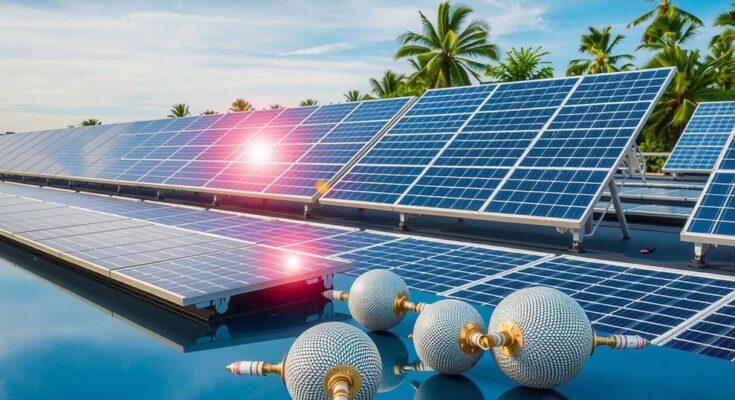The article discusses the resilience of Malaysia’s solar industry amidst potential new tariffs under Trump 2.0. It highlights the importance of increasing local content to maintain competitiveness and reduce dependency on the US market. The historical context of previous tariffs and ongoing investigations by the US Department of Commerce are essential to understanding the current challenges. Despite these trials, significant investments from Chinese firms underline continued interest and investment in Malaysian solar manufacturing.
The imposition of new solar tariffs proposed under the Trump administration poses a significant challenge for Malaysia’s solar industry. Malaysian academic Tham Siew Yean suggests that instead of a mere reactive strategy of relocating to evade tariffs, enhancing local content in production processes within Malaysia is vital. Since 2008, Malaysia has attracted substantial foreign direct investment through enticing incentives, with notable companies such as First Solar and Jinko Solar establishing operations there.
Historically, the tariffs enacted under Trump’s first administration in 2018, which started at 30% and were designed to protect domestic solar interests, have had a mixed impact. Biden’s subsequent 24-month moratorium in June 2022, came as relief but opened investigations into circumvention practices involving Malaysian manufacturers. By August 2023, it was confirmed that not all Malaysian companies were found to be circumventing tariffs, yet some companies did not comply with information requests, raising concerns about transparency.
As the US Department of Commerce continues its investigations into import practices from several Southeast Asian countries, including Malaysia, the outcome may lead to countervailing and anti-dumping duties. These measures aim to create a level competitive landscape for domestic producers but concurrently threaten the viability of foreign entities operating locally. On the hope of maintaining competitiveness, various firms, including Jinko Solar and Hanwha Q CELLS, are contesting the findings while Malaysia’s Ministry of Investment, Trade, and Industry (MITI) seeks to facilitate exemptions for those meeting local content thresholds.
Investments from Chinese firms, notably LONGi Green Energy and Risen Energy, remain steadfast despite tariff challenges, highlighting a robust interest in Malaysian manufacturing capabilities. However, with possible expansions of tariffs under the next Trump administration and uncertainty on final determinations, businesses may need to explore market diversification to mitigate risks linked to US dependency.
In conclusion, while Malaysia’s solar sector faces substantial tariff-related challenges, focusing on local production enhancements and diversifying export markets may provide pathways for stability and growth. As implementation of final duties approaches in 2025, the industry will require strategic adaptation to navigate the evolving landscape effectively.
The article addresses the potential risks and strategies associated with the solar industry in Malaysia, particularly in light of the tariffs reinstated and proposed by the Trump administration. The Malaysian solar sector has historically benefitted from foreign investments amid a favorable economic landscape, attracting various global players by offering competitive incentives. With new protective tariffs introduced, Malaysian firms face the dual challenge of maintaining competitiveness while ensuring compliance with US trade regulations. The evolving policy environment necessitates a data-driven approach, focusing on local production capabilities and compliance to safeguard Malaysia’s strategic position in the global solar market.
In summary, Malaysia’s solar industry is at a crossroads due to impending tariffs proposed under the Trump administration, requiring innovative strategies to sustain its operations and growth. By enhancing local content in production and seeking exemptions based on local content thresholds, firms could mitigate the adverse impacts of tariffs. As companies navigate the complexities associated with US trade policies and competition from Chinese manufacturers, market diversification and strategic investments will be essential for long-term viability and success.
Original Source: www.thinkchina.sg




